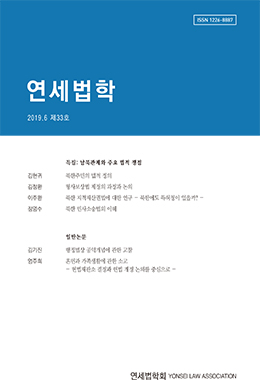혼인과 가족생활은 부부와 자녀를 구성원으로 하는 사회 최소단위의 공동체에 대한 보호를 제도화하며, 혼인과 가족생활에 수반된 기본권들을 보장하는 것이다. 본고는 제헌 헌법 이후 우리 헌법 개정 역사 속에서 혼인과 가족생활 규정이 어떻게 발전되어 왔는지를 살펴보고, 현재 헌법과 법률의 해석으로 헌법재판소가 바라보는 혼인과 가족생활의 개념을 검토하였다. 그리고 2006년 한국헌법학회의 헌법 개정안을 시초로 최근 2018년 한국헌법학회가 제시한 개정안까지 헌법 개정 논의 과정 속에서 혼인과 가족생활 규정이 어떻게 다루어지고 있는지 검토함으로써 혼인과 가족생활규정에 관해 헌법적으로 의미 있는 통찰을 제시하였다. 헌법재판소 결정과 헌법개정 논의들을 살펴본바, 혼인과 가족생활은 개인의 존엄, 자율성, 평등의 가치를 내면화하는 제도이자 미성년인 아동을 양육 보호하고 교육할 수 있도록 제도적으로 보장하는 기반이 된다. 가족생활은 평등한 부부가 중심이 되는 것은 물론이거니와, 자녀의 양육과 교육도 가족생활의 핵심적인 내용 중 하나이다.
헌법재판소의 결정들은 혼인과 가족생활의 의미로 개인의 존엄과 양성의 평등을 지속적으로 확인하고 있고, 문화현상과 관습적 생활양식을 담은 보편타당한 윤리와 도덕관념으로의 기준을 제시하고 있다. 또한 선량한 성도덕과 일부일처주의 혼인제도 유지의 가치를 표명하고, 가족생활에서 자녀 교육의 권리와 의미를 확대하고 있다. 헌법 개정의 시도로서 2011년과 2016년 대화문화아카데미 개정안부터 소수자의 인권과 동성결혼 등의 새로운 가족형태 도입의 필요성을 언급하면서 양성평등을 성평등으로 개정을 제안하고 있으나, 제헌 헌법 이후 유지되어온 조항에 대해 혼인과 가족제도의 해석을 달리해야 할 정도의 헌법 변천이 이루어졌다고 보기는 어렵기 때문에, 전통적인 헌법적 가치와 해석을 변경하기 위해서는 국민 전체의 컨센서스가 이루어졌다고 볼만한 헌법 개정의 절차적 정당성이 필요할 것이다.
The meaning of the provisions on marriage and family life in the Constitution is to institutionalize the protection of the minimum community of society with the couple and children as members and to guarantee basic rights entrusted to the married family. This article examines how rules of marriage and family have been developed in the history of amendment of the Constitution since the Korean first Constitution, and examined the concept of marriage and family life that the Constitutional Court sees in the interpretation of the present Constitution and the law. In addition, from the Constitutional amendment bill of the Korean Constitutional law association in 2006 to that in 2018, how regulations of marriage and family life are being dealt with were examined in the process of revising the constitutional amendment. As a result of examining the Constitutional Court's rulings and discussions on the amendment of the Constitution, marriage and family life is the regime which internalize the value of individual dignity, autonomy, and equality and provide a basis for institutional guarantee for children’s protection, education and custody. Family life is not only centered on equal couples, but also children’s support and education is one of the core contents of family life.
The decisions of the Constitutional Court have continued to identify individual dignity and equality in the sense of marriage and family life, and presented standards for ethical and moral notions of universal relevance that include cultural phenomena and customary lifestyles. It also expresses the value of good moral and monogamous marriage system maintenance and extends the rights and meaning of children's education in family life. As an attempt to amend the Constitution, it is proposed to revise the equality of both sexes as “gender equality” since 2011 because it is the cornerstone for accepting the form of a new family such as same-sex marriage. However, it is difficult to declare that the interpretation of the marriage and family system under the constituent power has been changed as the changes of the constitutional meaning from equality of both sexes to gender equality. Therefore, in order to change the traditional constitutional values, the procedural legitimacy of amendment of the Constitution, according to the consensus of the whole nation, is needed.




